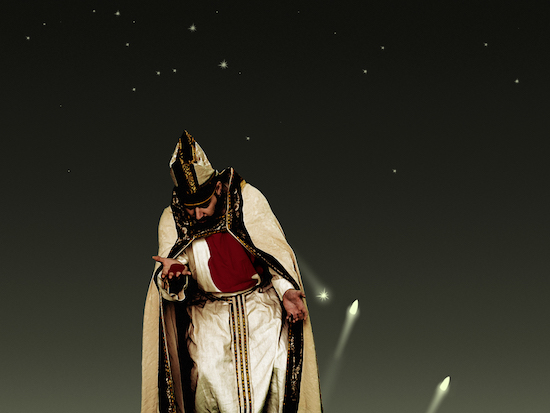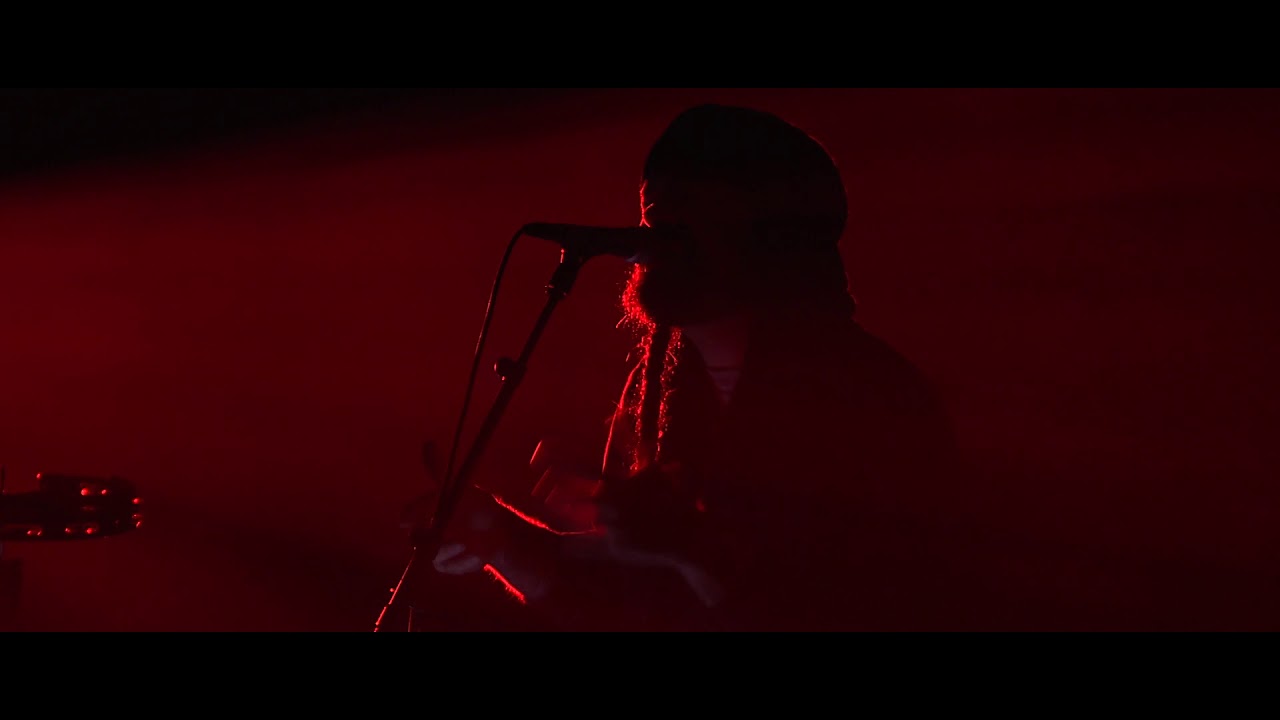Rolling Stone by Ulver live at Bergen International Festival. Technical Facilitator: Bright Norway. Video produced and edited by KolibriMedia
Ulver have shape-shifted many times in the 25 years since their “trollish” black metal beginnings in Oslo. But perhaps the most drastic transformation was on last year’s The Assassination Of Julius Caesar: an album which showcased a new “pop” direction, albeit one suffused with a mythic melancholy. On opening song ‘Nemoralia’, they dispassionately set the scene by drawing a historical line from Emperor Nero’s burning of Christians through to the death of Princess Diana.
An EP followed called Sic Transit Gloria Mundi, which has just been released on vinyl. It includes two songs that constitute the “the sad remains of the Caesarean banquet” and a studio cover of Frankie Goes to Hollywood’s ‘The Power Of Love’ (over a decade in the making) which closed Ulver’s sets when they toured the album. The vinyl also includes live renditions of four songs from Caesar.
The band also played a particularly memorable set at Bergen International Festival this year, which was filmed for posterity (you can watch them playing ‘Rolling Stone’, at the top of this feature).
TQ met with Kristoffer Rygg recently to talk all of this and more.
‘Echo Chamber (Room of Tears)’ is a fascinating song, lyrically speaking. Particularly the way you’ve connected events which are somehow joined by two 7s or the number 77 – why did you choose those numbers and what are their significance?
Kristoffer Rygg: We didn’t choose those numbers so much as they chose us. We look for common denominators, when we write and when we do our, uh, research. Things pop up and start talking, and we listen.
And with the events that are joined together by those numbers, what were you intending to convey?
KR: What I can say is that when we write, there are a few techniques, or associative methods we work by. For example, it can be to create a sort of unity from marrying disparate sources. It’s like montage, in a way. And that’s also how we approached ‘Echo Chamber’. It actually starts with something we stole from a news piece – about the papal conclave, and how the election of a new pope is signalled to the people via white smoke from the Sistine Chapel. The somewhat bizarre numerology came a bit later because of the fortunate, or rather unfortunate, correspondence of those numbers in relation to some of the things we were looking into, or thinking about. As for its weight or meaning, I think it’s about textual symbiosis, first and foremost, how things sometimes align in the most uncanny ways.
It was interesting to me to see the Great Fire of London and the 7/7 attacks represented there, and how London takes a focal point as a city in the song, and how interesting that was to you, because you seem to have a connection to England and London in your music. How deliberate was that?
KR: Well, we do obviously have a thing for blue blood, monarchy and all that, and England is rich on those traditions. But it’s as mysterious to us, I think, how these things repeatedly find their way back into our work, as it probably is to you, or anyone else. I’m not sure I have a good answer as to why we keep going back to England. Well, apart from the obvious, that you guys have an interesting history with lots of things for us vikings to plunder and pillage. [Laughs]
The cover artwork is Francis Bacon’s ‘Study After Velázquez’s Portrait Of Pope Innocent X’ (the “screaming pope”) – it has a strong link to this song doesn’t it?
KR: It’s quite illustrative, of course, and maybe especially interesting in this context because it is a re-interpretation of older art. An iconoclasm of sorts. But yes, the pope stuff is another hang-up: we’ve had our eye turned towards Rome and the Vatican business for a long time. It probably started with Blood Inside in 2005, I’m thinking about a video we made for ‘It Is Not Sound’. And those pontifical fascinations had a bit of a throwback now with Sic Transit Gloria Mundi, which is another papal ritual or ceremonial turn of phrase. The Room Of Tears is yet another reference. It’s the room where the newly elected pope changes from his cardinal’s red robe to the papal white.
Still from ‘It Is Not Sound’ video
Is it the ceremony itself that intrigues you or the sense of what is hidden within that ceremony that makes it so compelling?
KR: Both, I think. But what we’re doing, more than anything, is looking for potent imagery. Very simply put, that’s our primary interest: to find images that speak to us.
There’s also the lyrical reference to the attempted assassination of Pope John Paul II in Caesar isn’t there, on the song ‘Transverberation’…
KR: Yes, that’s right. I remember that vividly from when I was a small boy actually, living in Portugal and watching the news on the telly. It was quite shocking, a kind of watershed moment. And this somehow came back to me as we were trying to write some lyrics, working to tie what’s going on to geolocation or maybe plant a sort of trajectory. It’s overly concrete, and kind of corny at the same time. I like that.
‘Echo Chamber (Room Of Tears)’ has an abstract reference to the Breivik attacks and that’s very sensitive territory. Why did you want to include a reference to that and how did those events impact you as a Norwegian?
KR: It is sensitive. But I think that is probably why we should include it, and maybe especially because we are Norwegian. Actually, for ‘Echo Chamber’, our initial idea was that we wanted it to read like a sort of news feed – a news feed direct from the neural network of Ulver! And yes, the grim things do catch our attention, how can they not? But I really hope the critical or heart-broken angle comes across. I guess it’s our way to process the world; a fucked-up place where fucked-up things happen every day! Not with any philosophical or political agenda, or to be “edgy” or anything like that, but as a human response. We filter the onslaught through this band, you know. It’s a sort of coping mechanism. Also, our heart tells us not to shy away from what is difficult. Sometimes we do discuss these things internally, that maybe this or that is a bit too much, maybe it will be taken the wrong way. I’m not really answering your question here, but I’m trying to tackle it emotionally… This is something that actually started with Shadows of the Sun – the way that some feelings were formulated, the regrettable truths just laid out bare, there’s a sort of heart-sigh aspect to this. A realisation of the nature of man and things, and just how exposed and vulnerable we are as human beings. Thus passes the glory of the world, quite simply. I’m sorry, but I have no other way of trying to talk about this really, why we write what we do.
Do you think that way of operating lyrically suits where you are musically with Caesar and the EP? That there’s something particularly grand but also slightly removed in the kind of music you’re making? That it feels appropriate to take that lyrical stance as well – do you agree that the music has that atmosphere about it?
KR: I haven’t thought that much about those distinctions, to be honest. I could maybe turn that question around and ask you the same. How do you feel that it works? What I can say is what started with Caesar – which is the first time that we did this – is that we would write drafts of lyrics, to sort of have something on the table, a scene or something. Then we would listen to the music and go back and rewrite or re-adapt those lyrics to better fit the music. This is something we never did before, so in that sense there’s been some dual concerns. There’s a musicality to the lyrics: and there might be a pronunciation issue or something, ‘How does this word ring if sung there’, you know.
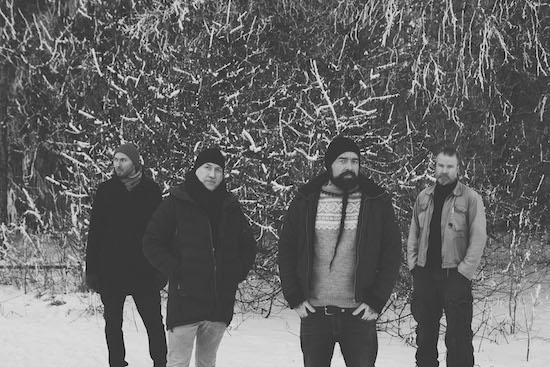
Did it help to have a strong concept behind the album to help frame and sculpt what you were doing musically and lyrically?
KR: Are you talking about Caesar?
Well, I guess that’s the interesting thing about the EP – do you see the songs as a continuation of the album? The press release describes them as off-cuts of the “Caesarean banquet” as you put it…
KR: This EP is more or less like an afterthought, to me. We had quite a few ideas flying around during the making of Caesar and these were the two demos we left out that maybe had the most potential. They obviously weren’t finished at the time, but we felt there was something there, and decided to work some more on it last summer. So that’s the prosaic answer. And obviously there’s the cover song [‘The Power Of Love’] which we had lying around for years and years, an old project which we’d never completed. We thought that maybe this was a good occasion to get that back into play as well.
Was it the case of you being able to finally rise to the challenge of that song?
KR: It was more a case of it finally fitting into the musical framework, I think. I don’t remember why we never finished that song to begin with, it’s such a long time since we started it. But yeah, it was that feeling that suddenly it fitted quite well with the whole “pop” trip we’ve been on lately.
And is it true that you started work on that some 12/13 years ago?
KR: Yeah, it’s a long, long time since we made the first roughs.
What is it about the song itself? It’s a love song but a strangely heavy love song at the same time. Is there any particular way that you’d characterise it?
KR: I’m afraid I don’t have any interesting personal stories of love and romance for you [laughs], but it is no big secret that I am an old 80s romantic. I’ve adored that song ever since it ruled the charts when I was a kid. Very simple and boring answer, I know. It always moved me when that tune came on, I’d instantly start to sing along. I guess I associate it with a kind of innocence of times past. I’ve wanted to cover it for a long time, and we started the process around the time we made Blood Inside or something, or maybe right after. I can’t really remember exactly. But it’s always been lingering in the back of my mind. It’s a nice note to end things on, I think: an ode to love itself.
There are some live tracks on the EP. It feels like the songs and the way they’ve taken on this grand pop sound, they really benefit from the natural reverb and way the sonics behave in a given space. They sound really great live. A song like ‘Nemoralia’, it really booms out…
KR: It’s more immediate, and for that reason it’s been quite fun to stand in the midst of it live sometimes. Interestingly, even though Caesar has stringent production values, the music itself is less constructed, I would say, than a lot of the music that we made before, where we’d often start at the wrong end, inside the computer, and then add the drums late in the process and so on. Most of the songs for Caesar or even the EP were born (at least in their rudimentary form) in a playing band situation. We’d have the drummer over, rig up some synths, pads, mic, percussion and play together, bounce ideas around. So a lot of these things come from that way of creating music, which I guess is the more conventional way. This is something relatively new to us in our band, and… I guess it translates.
And it’s also the case is it not that you’ve been very particular about playing live and how that is recorded, so you must have felt particularly confident in these recordings to think that they merited inclusion on the vinyl…
KR: Particular? [Laughs] We’re certainly guilty of being a bit, uh, selective, if that’s what you mean. Anyway, this material has been amusing for us to play live because it works in a more instant way. It’s got grooves and hooks, you know. People dance to it! [Laughs] It’s tapping into the pop feeling, so it’s maybe less vulnerable, in a live environment. It hits broader to some extent and it’s not straying too far… It’s not going off into atmospheric improvisation and things like that so much, though in some places we did that too… But yeah, I guess we did play some decent gigs last year. It made sense to mix some tracks.
The sets you were playing last year were exclusively material from the album and the EP. Is this a contained moment for the band or a step in an evolution? Can you see yourselves playing these songs in isolation, one or two of them in future live sets, or is it a body of work that needs to be represented live as a body of work?
KR: It doesn’t have to. But for me, this is more about the coherency of the presentation and what you’re doing at a given time. And it also has to do with the instrumental set-up and logistical things. So for last year and this year as well that stuff has been what’s most relevant, and rewarding for us to perform live. In the continuation, I don’t know: it’s anyone’s guess. But it makes sense to me to be a bit project-oriented about these things; we did the same when we released Wars Of The Roses back in 2011. We went out and played about 30 gigs just performing that material, because that was the headspace we were in at the time. And we did it again now, just with a different sound and a different visual show. That’s the weird thing about being in Ulver. There’s so much different stuff we’ve done over the years that it’s difficult to pull off an anthological set in a way. Because it comes from so many different places, historically, aesthetically, but also practically, in terms of our set-up and who’s playing what.
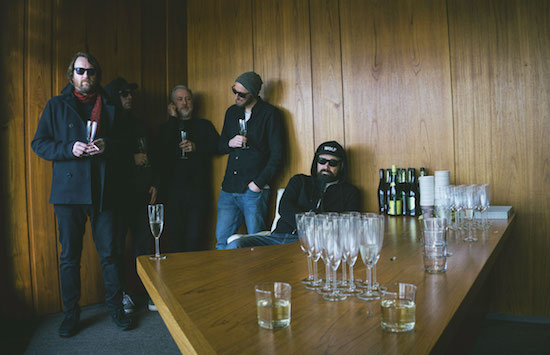
Going back and thinking about embarking on Caesar and embracing these classical themes – what was the source of that? I can’t help feeling that your name [“Ulver” is Norwegian for “wolves”] has such a strong resonance with the foundation of Rome, Romulus and Remus…
KR: That’s true. Sucking on the tit of the wolf mother! That’s a potent image right there that we have yet to use. [Laughs]
What set you off on this path musically and conceptually about classical Rome?
KR: Well, first off: there really is no clear-cut concept, which would be perfectly reasonable to assume judging by the title, of course. But what can I say? We thought of it mainly as a killer title: The Assassination Of Julius Caesar. So we had that, which we had more or less settled on right from the beginning, and then we had Bernini’s fantastic sculpture, ‘The Ecstasy Of Saint Teresa’, and later the ‘Colossus Of Nero’ – quite a few Rome-centric things, in our mental scrapbook – things that we knew we wanted to work with, or write about. Then, as the ball starts rolling, it’s all down to how things unfold and revolve by the strange laws of chance and circumstance. And again, it’s difficult to delineate; why are we attracted to certain objects or this or that event? Obviously it’s a big one, the assassination of Julius Caesar: a pivotal moment in history. It’s also old and we do tend to look back in time, which is something we touch on in ‘Angelus Novus’, where we lift some things directly from Walter Benjamin’s theses on history. What we try to do is connect all these fascinations somehow, as I said before, when they correspond, or we find common denominators. Things that might seem analogous or conspicuous to us, you know. It’s really a sort of associative journey in time and space. Does that make any sense?
It does, and I have quite large follow-up question. Do you see what’s happening with the post-World War 2 liberal consensus – is that equivalent to you to the decline of the Roman Empire? Are we living through a modern version of the events that befell the Romans?
KR: I’m afraid we might be, but I guess in a thousand or more years we’ll know! If anyone’s still around. How long will the ghosts of our time haunt us? What will they call us? The World War Era? The Genocidal Age? It’s food for thought. And a good way to relate the attractions we just talked about actually. You keep asking “why?”. But maybe it’s “because”, because history haunts us, it’s been haunting us for years and years and years. At some point you just have to acknowledge the fucking Armageddon.
As you were saying earlier about starting with a title or starting with a piece of art – is it fair to say that Ulver is led by aesthetics rather than anything else? Here, it’s responding to art or archetypal moments in history. Has that always been the way that you’ve worked as a band or has it happened more frequently as you’ve progressed?
KR: Yes, that’s a fair assumption. We are feeding off the things that interest us, of course. And as I said, we’re not too concerned about weighing these responses down with ideology or politics. We are an emotional band, first and foremost, it’s more about opening up new spaces through these things, or these sources. We did that really far back in the day too, almost paraphrasing certain national poets or such – the things we were interested in back then. So in a way you’re spot on, it’s what we’ve been doing all along. We even made a double album based on William Blake, you know. So yes, we’ve always been heavy samplers – since before we actually started using samplers! [Laughs]
That leads me to ask, you’ve been going for 25 years now – is the Ulver of 1993 still present in the Ulver of 2018?
KR: I would say “no”. Maybe to some extent, but more as an emotional undercurrent rather than anything stylistically relevant.
Apart from perhaps in the way you just described – the way you take your inspirations…
KR: Well, some things don’t change. You are who you are, in the animal sense. And don’t get me wrong, I have lots of good memories of the metal days and don’t wish to underplay that stuff, at all. It’s just… it’s part of someone I was a long time ago. I think it’s easy to forget that when you see it from the outside, you know, people are picking up on those albums even today, discovering them and digging into the lore. It’s easy to get emotionally engaged and ascribe this or that quality to us, and lose sight of the fact that we’ve been working rather persistently for a quarter of a century now. That’s a long time. Interests obviously change along the way, and maybe with us a lot because we are restless souls. That’s why we always try to do something a bit different from what we did last. We probably took that a lot further than most bands. But at the same time, there are things, forces or motivations that somehow feel very similar now as to how I felt when I was 17/18 years old, working with blast beats and distortion and screaming vocals. The form is different but the feeling is… ah! This is getting too verbose, man, a bit too flamboyant!
No, no, I’m enjoying what you’re saying. To try and pin you down on what that feeling is. If there’s an essence which is hard to define which does run through everything…
KR: … I guess there’s a sort of underlying minor chord, if we’re going for an overarching metaphor.
I think that’s a beautiful way of putting it. Would you describe the pop music you’re making now as “heavy” pop music?
KR: Yeah, why not? It’s heavier than… at least lyrically it is not exactly your daily radio fodder. [Laughs] I guess also musically it’s somewhat darker, denser. I’m no expert on contemporary pop music but my guess is that that’s true.
If you compare it to Ariana Grande or Katy Perry it’s in a different universe.
KR: [Laughs] We’re more gothic than they are!
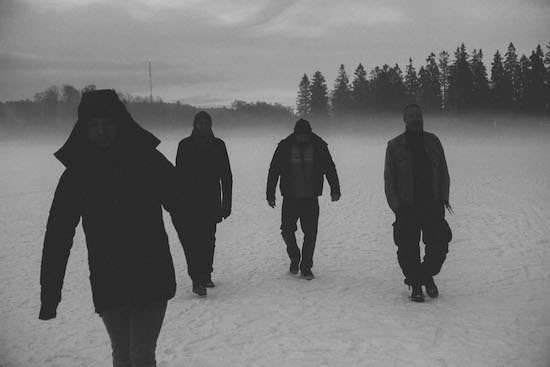
For you, as part of your evolution, do you see it as a transgressive act to make pop music? Is it an important step of a new threshold that may or may not alienate people, or in this case actually open up the band to a new audience potentially?
KR: We stopped thinking so much in those ways. What happens in Ulver, happens. It’s only music. Had we worried too much about such things we just would never have gotten anything done, I think. Besides, with time we’ve learned to trust ourselves and our audience. It’s really surprising though, how many forgiving souls are out there in light of some of our departures. So I try not to overthink this, to be honest, and just go with the flow: do what we want without too much apology.
But at the same time you’re conscious that there could be risks in doing that…
KR: I was maybe more conscious of it before. Because ironically, the most risky thing we could do now is probably to do something similar next time. [Laughs] We’ve gained that kind of reputation, which is quite funny. It’s almost like it’s expected for the next album now to be jazz improv or something. To always break the chains. If we had to follow that logic it would be very limiting – if the shape-shifting was the end game. I’d say this is more down to a certain feeling of completion within some of the projects we have done. We often feel they are done to the extent it doesn’t really need to be repeated, at least it’s not that interesting to us to repeat it. It’s more interesting to start fresh, go somewhere else, try something different, it’s that kind or attitude.
I have one last question in honour of Emperor Nero. Nero was a frustrated poet and musician. Do you think they make the worst tyrants?
KR: Ha! Good one. Guilty. Guilty as charged!
I can’t imagine you’re that frustrated.
KR: Oof, that’s a good follow-up, but it’s also maybe a completely different conversation!
Sic Transit Gloria Mundi is out now on House Of Mythology

